
|
- 1820, November 28, Frederick Engels was born in Barmen, Rhine province, Prussia (Germany) into the family of a textile manufacturer. - 1834, October, Frederick Engels enteres Elberfeld Gymnasium - 1837, September 15, on his father's insistence, he leaves gymnasium and began working in his father's office. - 1838, July, moves to Bremen to learn commerce in Heinrich Leupold's office, owner of a large trading company. - 1839, March 1839, while in Bremen, he devotes his leisure to World literature, Philosophy and History; publishes his "letters from Wuppertal" in "Telegraph fur Deutschland" and also his poems, reviews and essays in various literary periodicals. - 1841, March, returns to Barmen - 1841, October, Engels does military service artillery brigade in Berlin. In his free time, he attends lectures in Berlin University and establishes close ties with Berlin Group of Young Hegelians; he writes and publishes several articles criticizing the reactionary views of Freidrich Schelling, idealist philosopher and lecturer at Berlin University. (to Oct. 1842) Frederick Engels studies Ludwig Feuerbach's "Das Wesen des Christhentumbs". - 1842, Spring to December, he writes a number of articles for "Reinische Zeitung" of Cologne, whose editor in chief was Karl Marx. October 8, he leaves Berlin for Barmen. November, Frederick Engels leaves for England to learn commerce at the spinners of Ermen & Engels Firm in Manchester. On his way to England, stops in Cologne and makes the acquaintance with Marx in the editorial offices of Reinische Zeitung. - 1842-1844: While in England, he studies social and political relations there and the life and labor of English workers and writes a number of articles for Reinische Zeitung. He contacts the leaders of Chartist Movement, takes part in meetings sponsored by Chartists in Manchester, writes for Chartist periodicals, makes the acquaintance with socialists, followers of the utopian socialist Robert Owen and regularly attends their Sunday meetings in Manchester Hall of Science. He also studies works of bourgeois economists, exponents of utopian socialism and communism. - 1843, May, he makes the acquaintance with Karl Schapper, Heinrich Bauer and Josepf Moll, leaders of League of the Just, a secret organization of German communist workers. November, Engels' article "Progress of Social Reform on the Continent" appears in "New Moral World", a newspaper of English socialists. - 1844, February, the first issue, a double one of "German-French Year Book" appears in Paris under the editorship of Karl Marx. His and Engels' articles occupy a central place in it. Among them is Engels' "Outlines of a Critic of Political Economy". August, on the way from Manchester to Germany, Engels stays with Marx for 10 days in Paris. This is the beginning of their friendship and joint work. In Paris, Engels meets French democrats and socialists. He accepts Marx propsal to write a joint work criticizing Young Hegelian. August to September, he writes and publishes two essays on social changes in England, in "Vorwartz" , a newspaper that appears in Paris with Marx' participation. September 6, Engels leaves Paris for Barmen. September to March 1845, Barmen, he works on his book "The condition of Working Class in England". He establishes relation with socialists and democrats of Rhine Province and conducts revolutionary propaganda. - 1845, February, Engels has two meetings in Elberfeld (* & 15), programming communist ideas. The first joint-work of Marx and Engels "The Holly Family, or Critic of Critical Criticism" April, Engels joins Marx in Brussels. May, "The condition of Working Class in England" book appears in Lepzig. June 12 to August 21, Marx and Engels visit England to study the latest English books on economics and also to gain insight into England's economic and political life and English working-class movement. They meet leaders of London Communities of League of the Just, Karl Schapper, Joseph Moll,... Autumn 1845-1846, Marx and Engels work on "German Ideology". This becomes an important stage in the elaboration of the theoretical principles of communist party. 
Frederick Engels, 1845
|
© Copyright Caroun.com. All rights reserved.